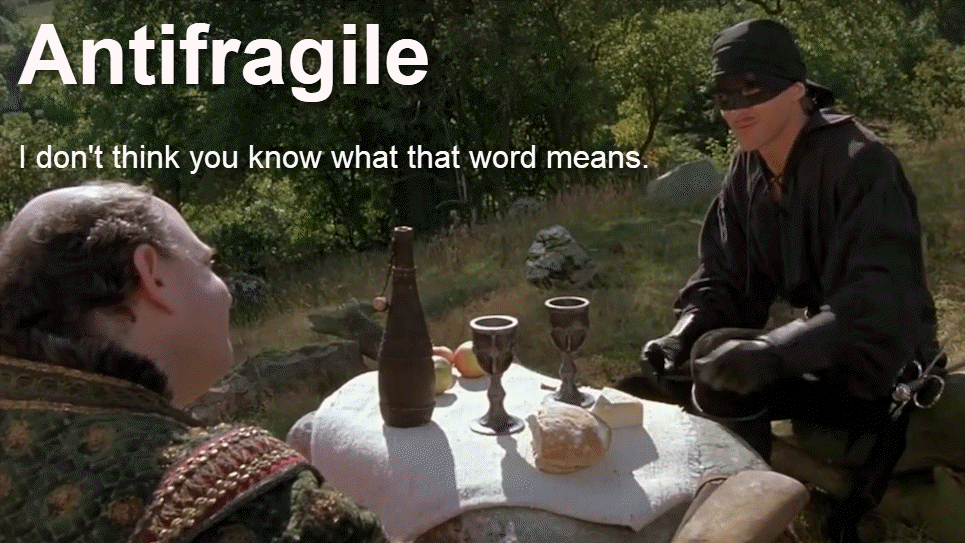5 Take-Aways from 'Antifragile' by Nassim Taleb

Taleb has insight. Neither self-serving sycophant of finance, nor a sore loser critic on the sidelines, he has worked with large amounts of money in a practical sense without taking it too seriously as an abstract concept. This makes him sometimes drawn out and difficult to comprehend while at other times iconoclastic.
His writing is dense. Reading his explanations and presentations of his central ideas requires a degree of acuity, even when he tries to be simple. His humor is characterized by witty pet names and terms ("Soviet-Harvard Illusion") with plenty of hyperbole and irreverence.
But the thesis of the book is encapsulated by the opening line:
“Wind extinguishes a candle and energizes a fire.”
That is, some things are harmed by variance, volatility, pressure, and change - particularly on a nonlinear level. Other things are strengthened by them. Taleb’s idea is that we should embrace the latter, operating in a manner that utilizes anti-fragility to our benefit, both personally and on a society-wide level.
He has little remorse for the fragile. He dedicates pages to denigrate the ‘fragilistas’ who have wormed their way into the upper echelons of government, education, and business (more on that later).
Here are the key takeaways:
1) Asymmetry
The key feature of both fragility and antifragility is asymmetry.
Fragility implies that small potential gains are matched with large potential losses. Antifragility is the opposite: large potential gains are matched with small potential losses.
A simple example is forest and prairie management. Yearly managed burns create small losses while avoiding the potential for massive fires later. On the other hand, preventing and stopping small fires creates conditions where much larger fires inevitably occur sooner or later. One utilizes anti-fragility. The other creates fragility through attempting to impose a false logic of stability.
In the first instance, you avoid large losses at marginal cost. You are making yourself anti-fragile. At any given moment, small fires are less likely to become big ones.
In the second, you embrace catastrophic losses down the road to achieve marginal benefit immediately. You are fragile and increasingly susceptible to the eruption of large wildfires as time goes on.
When you have little to lose and lots to potentially gain, or are protecting yourself from major injury by accepting slight ones, especially in the face of inevitable or unforeseen change, you’re personally anti-fragile.
Examples of this asymmetry are all around us:
In dating, facing small embarrassment of rejection matches to the chance of scoring a more attractive dates and longer-term success with women -- verses the safety of immediate social comfort paired with longer dry spells, poorer social skills, and settling for fatties and single moms.
In fitness, minor strains and injuries of daily exercise leads to greater bone density and muscle mass -- verses the ‘safety’ and comfort of inactivity that weakens the body over the long term.
Generally, being anti-fragile means exposing oneself to minor risks for larger rewards. On the other hand, fragility entails avoiding small risks while setting oneself up for catastrophe later.
2) Optionality
Optionality equals antifragility.
Having plenty of choices (and being able to choose the best one) equals anti-fragility. For example, speaking 4 major world languages is a large advantage when traveling internationally compared to speaking just one. So is having multiple passports. Income streams from different sources and countries is even better. Having 3 potential dates is preferable to 2, which is better than 1, which is too close to zero. Having a car, motorcycle, and bicycle allows one to travel in a wider variety of ways, to further or more obscure corners than simply having one option, and have a wider range of experiences. Add access to a helicopter and now you have extreme optionality.
Having options that others don’t put one at a distinct advantage, especially during unforeseen circumstances.
3) Skin in the Game
A major problem today is that we listen to people who don’t have ‘skin in the game.’ Too, the people who make decisions (typically unelected, career bureaucrats) have nothing to lose if they are wrong. They've effectively transferred risk onto others; created antifragility for themselves at the cost of creating more fragility for those they lead, represent, or administrate over.
In primitive societies, leaders were not only expected to sacrifice, but they would be held personally accountable for misfortune.
Ask yourself, when was the last time a political leader was held to account for the harm they caused their own constituency? Typically, even if corrupt leaders are voted out of office, they exit their public careers as multi-millionaires and immediately enter into the private sector as highly paid consultants. Plainly stated, “democratic” politicians – along with a whole strata of executives, directors, and upper managers, are fragilista scam artists without real skin in the game.
This has two practical philosophical implications.
Firstly and most obviously, take with a grain of salt the loudly proclaimed opinions of those who have little to lose by being wrong.
Secondly and inversely, understand what skin in the game means when receiving information. When someone does advocate a position, you should find out if they stand to gain from their position being adopted on a wider scale or from you buying into it.
By this heuristic, we'd be immediately skeptical of single middle-aged women who decry the supposed crime of older guys dating younger girls, or tattoo artists who say that having tattoos looks cool.
4) Via Negativia
Often, improvement comes not through addition, but through subtraction. In effect, if we are trying to cure heart disease, a better route is to eliminate junk food, not add medication.
Optionality and back up systems can build redundancy, which is good. Our bodies are based on it. Having two hands (eyes, kidney, etc) is obviously better than having one. This is a useful evolutionary adaption.
But having too much useless stuff can create a fragilizing asymmetry.
Someone with a large house and corporate job has little to gain and much to lose compared with the poorer entrepreneur in a small apartment.
Traveling with suitcases full of clothes and personal items necessarily limits speed and mobility, especially when surprise factors or problems - volatility - arise.
Massive size and excess often create fragility; things can be more a liability than optionality.
Therefore, it's often better to eliminate (or substitute) that which is bad, unuseful, or harmful, rather than try to add something else to compensate for it.
5) Interventionism and Iatrogenics
Naive interventionism creates fragility – or even larger harm.
The overuse of hand sanitizers weakens the immune system by depriving it of opportunities to fight of bacteria in small doses, all while allowing your skin to constantly absorb toxic chemicals. Helicopter parents create manlets like Ben Shapiro.
Medication and hospitals can kill you.
Simply put, short-sighted measures to protect oneself from stress and volatility create bigger problems down the road.
Conclusions
Embrace discomfort to build antifragility.
Create and utilize asymmetry and optionality. Eliminate the true source of harm and unhappiness instead of adding more junk. Understand the importance of skin in the game. Avoid well-intended but harmful interventionism.
Better yet, lead a life of personal strength, wisdom, skill, vitality, and virtue.

